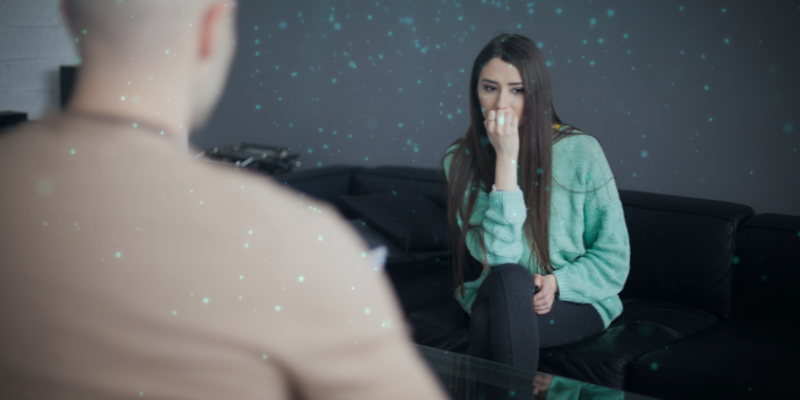
As a college freshman, Jenna was a competitive track and field athlete who loved spending her days in her running shoes. By the time she reached her sophomore year, however, things had changed. She was filled with sadness, felt like she had no energy, and had lost interest in training. When she mentioned it to her primary care doctor, she was diagnosed with major depression and given a prescription for antidepressants.
The medication boosted her mood—a lot! She felt like she was on top of the world. It also filled her with so much energy, she felt invincible and began training all day and staying up all night doing her homework. She also became sexually aggressive, hitting on the other track athletes even though she had a steady boyfriend. She even came on to her coach multiple times, which didn’t go over well and ended up with her almost getting kicked off the team.
What went wrong?
A Common Misdiagnosis
Jenna had been misdiagnosed. In reality, she had bipolar spectrum disorder (BSD), formerly known as manic-depressive disorder. People with bipolar disorder experience dramatic swings in mood, energy, and activity levels, going from depressive episodes to manic episodes in a cyclical pattern. The antidepressants Jenna took not only failed to work, but they were also making her worse by triggering a manic episode.
Jenna isn’t alone. Among people diagnosed with major depression, about one in three are estimated to actually have bipolar disorder. This is due to the fact that the two conditions share many of the same symptoms.
Shared Symptoms of Bipolar Disorder and Depression
Depressive episodes of bipolar disease are characterized by:
- Persistent sad or negative mood
- Loss of interest in usually pleasurable activities
- Feelings of guilt, worthlessness, helplessness, and hopelessness
- Sleeping too much or too little, or waking up too early
- Decreased energy, fatigue, or feeling “slowed down”
- Difficulty concentrating
- Thoughts of death or suicide, or suicide attempts
These symptoms are very similar to those typically associated with depression. Women with bipolar disorder tend to experience more depressive episodes, which may increase their risk of being misdiagnosed with depression.
Manic Symptoms of Bipolar Disorder
On the other side of the spectrum in bipolar disorder are manic episodes.
Manic episodes are characterized by:
- Abnormally elevated mood
- Inflated self-esteem
- Decreased need for sleep
- Increase in goal-oriented activity
- Grandiose notions, ideas, or plans
- Increased talking or pressured speech
- Racing thoughts
- Inability to “turn off the mind”
- Poor judgment that leads to risk-taking behavior
- Hypersexuality or hyperreligiosity
- Excessive appetite
- Inappropriate social behavior
- Irritability or aggression
- Delusions or hallucinations
Some people with bipolar disorder don’t experience mania to this level. They have what’s called “hypomania,” which is a less severe form of mania. People may feel like they have better energy than usual and a brighter mood but not so much that they engage in risky behavior.
The Key to Healing
The good news is that bipolar disorder responds well to proper treatment. Getting an accurate diagnosis is key. Jenna had struggled for a few years before she decided to get a brain scan to find out what was really happening in her brain. The brain imaging test called SPECT, along with a complete personal history and other assessments pointed to bipolar II disorder.
There are at least 4 types of bipolar disorder, including:
- Bipolar I disorder
- Bipolar II disorder
- Cyclothymic disorder
- Bipolar disorder not otherwise specified (NOS)
Knowing her condition type helped develop a treatment plan personalized for her needs. And seeing her brain scan helped her understand that her condition was real, so it encouraged her to take her medication regularly. Compliance is a problem for many people with bipolar disorder because when they start to feel better, they don’t believe they have a problem at all and often stop taking their medication. For Jenna, seeing was believing.
With the proper treatment and good compliance, Jenna’s moods stabilized, and she eventually became a successful and well-liked track and field coach at her alma mater. At Amen Clinics, we use leading-edge brain imaging technology called SPECT as part of an overall evaluation to accurately diagnose and treat bipolar disease. If you or a loved one is suffering from dramatic mood swings that are impacting your relationships or your performance at work or school, schedule a visit or reach out today to speak to a specialist at 888-288-9834.





Do you have a brain scan for schizophrenia? If so how accurate will the scan be in the diagnosis? Do you have a treatment plan to cure this as well?
Comment by Mary GENOVIA — June 14, 2019 @ 4:40 AM
Where are you located? Do you have facilities in Pittsburgh, Pa. ?
Comment by peggy thomaselli — June 15, 2019 @ 7:52 AM
Hello Peggy, thank you for reaching out. We have 8 current locations in the U.S.: https://amenclinics.com/locations/.
Comment by Amen Clinics — June 17, 2019 @ 3:18 PM
Hello Deirdre, thank you for reaching out. Yes, our SPECT brain imaging studies and treatment methods pertaining to diagnoses and symptoms related to schizoaffective disorder, schizophrenia, bipolar disorder, and related dual diagnoses. One of our Care Coordinators will reach out to you to discuss your specific needs.
Comment by Amen Clinics — June 17, 2019 @ 3:19 PM
Hello Mary, thank you for reaching out. Yes, our SPECT brain imaging studies and treatment methods pertaining to diagnoses and symptoms related to schizophrenia and related diagnoses. One of our Care Coordinators will reach out to you to discuss your specific needs.
Comment by Amen Clinics — June 17, 2019 @ 3:20 PM
I have a daughter is or was one Olanzapine. First 10mg, then 5mg, she left my home and is living in an apartment. At first she was diagn. with schizophrenia, and on redoline, the lowest doze, but she was gaining a lot of weight, and was then hospitalized whereupon they put her on another med, then finally olanzapine. She had no expression on her face, gained weight, but was able to work in a warehouse. Last time I saw her this week, she had lost a lot of weight, spoke well, and working, my only concerns are that she is noncompliant, and often has dirty clothes on and stinks. she worries my constantly. I believe she needs a brain scan, because I have no idea if she is schizophrenic or bipolar, as she fits into the manic symptoms of bipolar. I ordered you videos last yr. and she will not see them or read any info. what vitamins do you suggest, so I may get her on tract again.
Comment by martha tobias — October 24, 2019 @ 12:29 PM
How much is everything? Do u take health insurance?
Comment by Giovanna — October 24, 2019 @ 6:41 PM
Is it available in Australia?
Comment by Beth — October 25, 2019 @ 1:42 PM